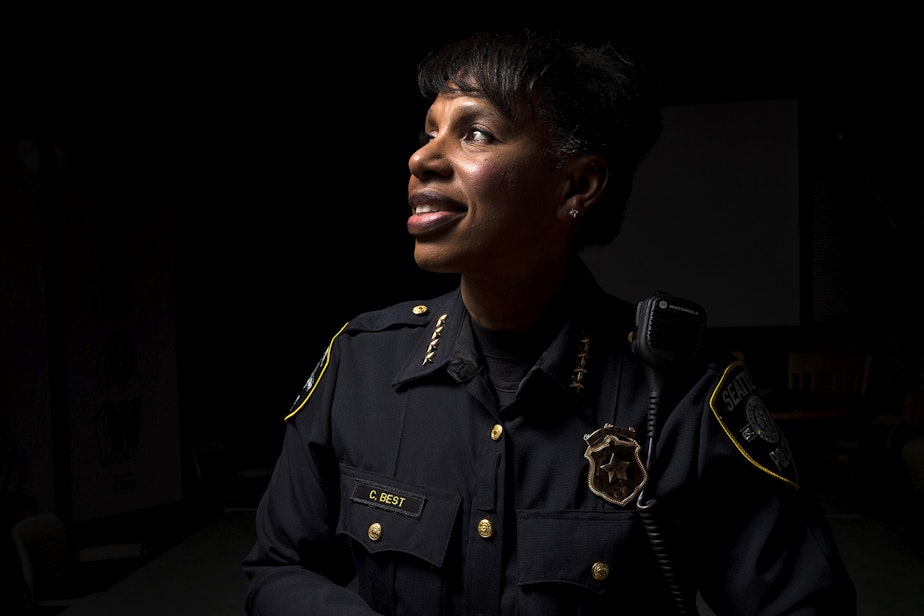Seattle needs a new police chief, and Carmen Best says she’s ready

In the early 1990s, Carmen Best was working as an accountant for a local insurance company when she saw a recruitment ad for the Seattle Police Department.
“I just wanted to do something different, try something out," she told Bill Radke. "Had no preconceived ideas about staying for a long time, or not staying, just thought I would give it a shot and see what happens.”
Twenty-six years later, Carmen Best is the interim police chief of the department. She took the job in January when Kathleen O’Toole stepped down. Until Seattle hires a new chief, she will be leading the department through changes to its use-of-force and biased-policing policies, contract negotiations with the police union, and the ongoing investigation into the shooting of Charleena Lyles.
Here are a few takeaways from Best's interview with Radke. Questions and responses were edited for length and clarity.
Does SPD need to change its policy or training in light of what happened to Charleena Lyles?
First, let me say this was nothing less than a horrific tragedy ... There are a whole host of things that came into play that made that incident at that moment in time occur. I think there's a whole lot of failed systems that just didn't work in terms of mental health and other things that could have helped prevent those officers from being there at that moment, dealing with that situation at that time. So that being said, I think that we need to work on a lot of different systems to make sure that no one falls through the cracks and it ends up in a situation like that.
Could it just as well happen tomorrow?
I'm not clairvoyant. Certainly, there could be a situation where an officer-involved shooting occurs. We're trying to do everything that we can to prevent it through our training, and we will review every incident. And this incident isn't done yet. There will still be an inquest, there's still an investigation that will occur further into it. There's a whole larger gamut of information that will be looked at through the inquest process, and anything we can glean or learn from that. We'll do that because we want to do a good job in this. Nothing is more important than the sanctity of life, and that under all circumstances, we're going to try to make sure that we do everything to protect life.
What was your takeaway from the letter Seattle Seahawk Michael Bennett recorded for ESPN?
It's really important that we listen. I don't take what Michael Bennett, or any other person, is saying lightly. We know there's a history. A great part of what we want to do is make sure that we are talking to our officers, we're bringing the right people onto the department, that our department reflects the community that we serve. Also, making sure that we're doing the appropriate amount of training and talking to officers about these issues of bias, of race, of history. We're not avoiding it. If we can't build trust, we're not going to be an effective police department. So we've got to start with the basics by having that dialogue. I absolutely can understand why there are concerns.
What do the Seattle police have to do to rebuild that broken trust Bennett is talking about?
Well, you have to be visible. People have to get to know the officers in situations that aren't just crime situations. They have to see us at the fairs and parades and out there actually being a part of the community — not apart from the community. I was talking to one of the college presidents recently, and she was saying how much she really enjoys and likes some of the officers that she knows, but she's still leery about the ones that she doesn't know. So I said, we've got to make opportunities for people to get to know more of us. And in a way, that's on a human level — and humanize what we're doing here and who we are. Because I think once that happens, we will build trust.
As a candidate for the job, do you get tired of being asked about race and gender?
I understand this is a huge issue in society, so I wouldn't avoid that. But I also want to make it very clear that that's not the criteria by which I am applying for this position. I am applying because I absolutely believe I have the best skills and can represent this department the best. And I know that I can get the job done.

